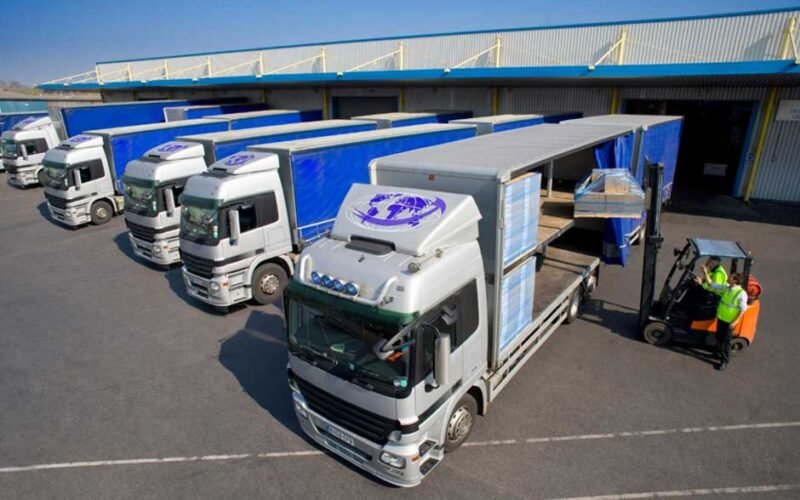Did you know that the global freight trucking market is projected to grow to $3755.92 billion by 2032? This shows the significant role freight trucks play in the global economy.
Freight trucks play a key role in the supply chain. They transport goods over long distances. However, the need for faster deliveries increases their environmental impact.
In this article, we will explore their effects on emissions and air quality. We will also look at sustainable transportation solutions.
The Environmental Impact
Freight trucks are essential for transporting goods worldwide. However, they have a significant impact on the environment. Here are some of its effects:
Air Pollution and Public Health Concerns
Every truck on the road adds to air pollution. Diesel engines release harmful pollutants. This includes particulate matter, nitrogen oxides (NOx), and sulfur oxides.
These pollutants can cause serious health problems, including respiratory and heart diseases. This pollution harms public health, especially in crowded areas.
Poor air quality leads to more hospital visits and higher healthcare costs. It also lowers the quality of life for people living nearby.
Fuel Consumption and Resource Depletion
Trucks use about 60 billion gallons of diesel fuel in the U.S. each year. This high fuel consumption shows the industry’s heavy dependence on fossil fuels. Rising oil prices make this reliance costly.
Extracting, refining, and transporting oil damages land and water. These processes cause pollution and destroy habitats.
Fuel spills and leaks make air and water pollution worse. This affects wildlife and human health.
Noise Pollution and Its Effects
Trucks do not just cause air pollution. They also create noise pollution. Loud engines, especially at night, disturb communities and affect public health.
Studies show that constant loud noise can cause stress and sleep problems. It can also increase the risk of heart disease.
In cities, the impact is worse because trucks drive through busy streets. Many people struggle to sleep due to the noise. This can lead to fatigue and poor health.
Impact on Infrastructure and Eco-systems
Trucks also damage roads and harm ecosystems. Their heavy weight wears down roads. This leads to frequent repairs and higher costs for cities.
Highways and roads can also disrupt natural habitats. Wildlife may struggle to find food and mates due to blocked pathways. This can reduce animal populations over time.
Water Pollution and Contamination
Freight trucking contributes to water pollution. This can be through fuel spills, oil leaks, and runoff from road surfaces. These contaminants flow into rivers, lakes, and groundwater.
Toxic chemicals from fuel and lubricants can harm marine life. They also affect drinking water quality for people and animals.
Increased Traffic Congestion and Energy Waste
The growing number of truck sales causes heavy traffic. Congestion leads to wasted fuel and higher emissions.
Idling trucks release pollutants even when they are not moving. This worsens air quality and increases fuel consumption.
Solutions for a Greener Future
The trucking industry must take steps to reduce its environmental impact. Here are some possible solutions:
Adopt Cleaner Fuel Alternatives
Switching to cleaner fuel alternatives can reduce pollution. Electric and hydrogen fuel-cell trucks produce fewer emissions.
Biofuels and natural gas offer cleaner options than diesel. Using these alternatives can help protect air quality.
Many trucking companies are investing in electric vehicles. These trucks run quietly and lower carbon emissions.
Improving fuel technology benefits both businesses and the environment. Lower fuel costs can save companies money over time. Cleaner trucks mean healthier communities with better air.
Improving Fuel Efficiency
Improving fuel efficiency can reduce fuel consumption and emissions. Trucks with better aerodynamics use less energy.
Using lightweight materials helps trucks use less fuel. Regular maintenance, like keeping tires properly inflated, can improve fuel efficiency.
Upgrading engine technology also plays a big role. More efficient engines burn less fuel while still providing power. Consider visiting www.mytrucknow.com to help you find efficient trucks.
Telematics and Efficient Routing
Modern technology helps make freight transportation more efficient. Telematics systems track routes in real-time. These systems suggest the most fuel-efficient paths.
Optimizing routes can reduce idle time and save fuel. Companies can avoid traffic and construction delays using telematics. This leads to faster deliveries and lower fuel costs.
Telematics also helps monitor truck performance, reducing maintenance issues. With real-time data, businesses can improve fleet management. Fuel savings add up over time, benefiting both the environment and the company.
Increased Funding for Sustainable Practices
More funding should be given to research on sustainable transportation. This would help develop new, greener technologies. Incentives can encourage companies to adopt these solutions.
Governments and freightliner dealers can work together to fund innovation. Research can lead to cleaner, more efficient trucks. New technologies can lower emissions and save fuel.
Investing in sustainability now can lead to long-term savings. It also creates jobs in green industries. Supporting research accelerates the shift to cleaner transportation.
Public Awareness Campaigns
Raising public awareness about the environmental impact of freight transportation is important. Consumers can help by choosing more sustainable products. Companies should share their sustainability efforts with customers.
Public campaigns can educate people about the benefits of greener options. When consumers understand the impact, they are more likely to make eco-friendly choices.
Companies can promote their efforts through advertising and social media. Transparent practices build trust with customers.
Educating the public can also lead to demand for cleaner products. This encourages businesses to adopt sustainable practices.
Optimize Freight Load and Capacity
Maximizing freight loads reduces the number of trucks needed. Full trucks mean fewer trips and lower emissions.
Using technology to calculate optimal load sizes ensures maximum efficiency. Properly loading cargo helps avoid underutilized space in trucks. This also saves on fuel and reduces road wear.
Green Logistics and Supply Chain Management
Adopting green logistics practices can optimize the entire supply chain. This includes reducing packaging waste and promoting recycling.
Companies can focus on sourcing eco-friendly products, which further lowers their environmental footprint. Efficient inventory management reduces overstock and waste.
Moving Towards Sustainable Freight Trucks
Freight trucks have a big environmental impact. They contribute to greenhouse gas emissions, resource depletion, and health issues. Understanding these effects is important for raising awareness and encouraging better practices.
Focusing on cleaner technologies and stronger regulations can reduce these impacts. This will lead to a more sustainable freight industry. By tackling the challenges of these trucks, we can move toward a greener future.
For more informative articles, check out more articles on our blog.










